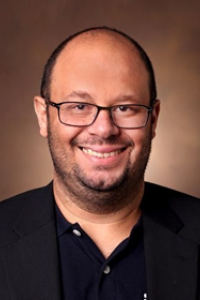Leadership
IMSD Directors

Dr. Digna Velez Edwards is a genetic epidemiologist, Professor of Obstetrics and Gynecology and Biomedical Informatics, Director of the Division of Quantitative and Clinical Sciences in the Department of Obstetrics and Gynecology, Director of Women’s Health Research center, and a member of the Vanderbilt Epidemiology Center. She has doctoral training in human genetics and has a master’s degree in statistics. She started as faculty in the department of Obstetrics and Gynecology in 2010 pursuing research focused on understanding the genetic determinants of complex disease and the role of gene and environment interactions in the risk for complex diseases, with a specific interest in fibroproliferative disorders that include uterine fibroids and keloids and diseases that disproportionately impact women’s reproductive health. She is committed to providing a supportive educational environment for all members of the Vanderbilt community.

Dr. Julie Rhoades is an professor of medicine in the Division of Clinical Pharmacology. Her research focuses on molecular regulation of cancer-induced bone diseases with the goals of identifying more effective therapies to improve outcomes for patients with metastatic cancer. As part of these efforts, she was formerly the President of the Cancer and Bone Society and a member of the Future Global Leaders committee in the International Federation for Musculoskeletal Research Societies, where she works to foster trainees with interests in bone and mineral research. Dr. Rhoades joined the Vanderbilt Faculty in 2008 and has been actively involved in the Cancer Biology and Pharmacology graduate programs and the IMSD. Dr. Rhoades is committed to continuing to build opportunities for belonging in graduate education and medical research by building supportive communities and pipelines that improve opportunities for science education and careers for trainees.

Dr. Henrique Serezani is an associate professor in the Departments of Medicine, Pathology, Microbiology and Immunology, and Pharmacology and the Associate Director of the Vanderbilt Center for Immunobiology. His research program aims to dissect the inflammatory signals that influence host defense during preexisting conditions such as obesity and aging. Since moving to Vanderbilt in 2016, Dr. Serezani has been heavily involved in mentoring trainees worldwide. He is a standing member of the Allergy, Immunology, and Transplant T32 study section. Serezani has been engaged in different tasks to increase inclusion at our school and in various scientific societies. Serezani’s goal as a co-director of the IMSD program is to advocate and promote awareness, engagement, and community building to strengthen the voices of trainees, so that every graduate student has the full opportunity to thrive at VU.
